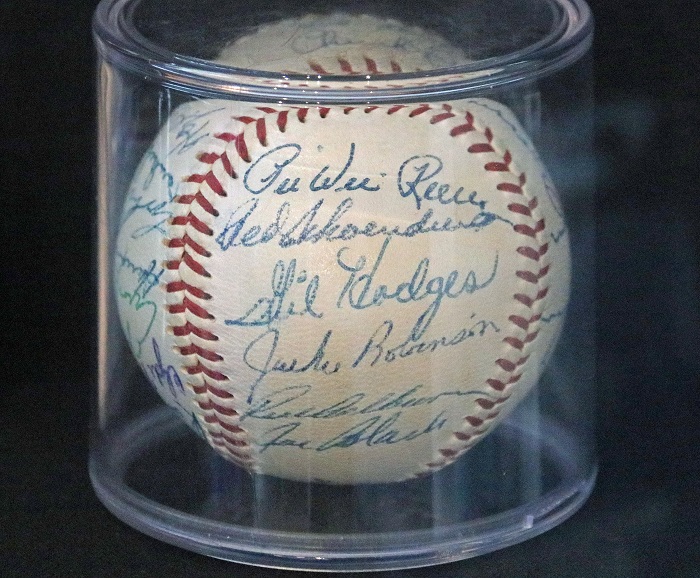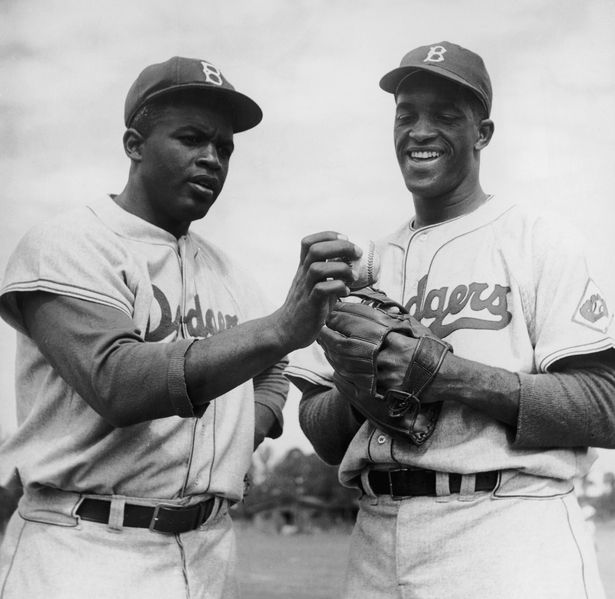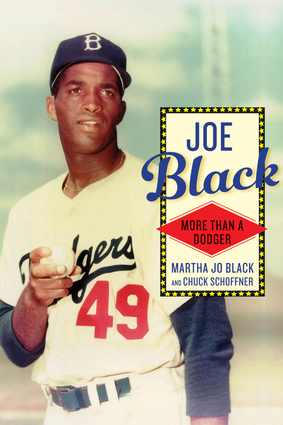The Most Valuable Player in the 2016 Arizona Fall League was 19-year-old Gleyber Torres, who is ranked second in the New York Yankees prospect list. He was the youngest player to participate in Fall League play and in fact was the league batting champion.
For his efforts, Torres was presented with the Joe Black Most Valuable Player Award. The award was first presented in 2002 and is in honor of Black who was a lesser known Dodger in the early 1950’s.
Although I was interested in the Yankees hot new prospect, I was much more interested in Joe Black when he debuted with the Dodgers in 1952, which is the same year that I debuted as a Dodger fan. I remember him from listening to Dodger broadcasts out of Brooklyn with Vin Scully – the voice of all voices – calling the games.
Joe Black was born and raised in Plainfield, New Jersey. His family was very poor, but he was a good student and a gifted athlete which earned him a scholarship to Morgan State University, a black liberal arts college in Baltimore, Maryland. He obtained a degree before he was drafted into the Army in 1943.
During his army time Black’s duties were such that he was able to continue to play baseball with the Baltimore Elite Giants. Described as strapping, the 6’2’/220-pound right-hander, continued to play in the Negro Leagues following the war knowing that Jackie Robinson had a blazed a trail that he hoped to follow.
While Joe Black does not have the illustrious career of Jackie Robinson as an African American player in a time when only six major league clubs accepted men of color, he endured the same struggles. He was told more than once that, “Colored guys don’t play baseball.” On more than one occasion he had to endure the chant, “Old Black Joe” emanating from the opponent’s dugout.
Sometime later he said: “I pitched my greatest games in miserable ball parks, in the colored league, with nobody watching.”
He was scouted and signed by the Dodgers in late 1950 and spent the 1951 season with the Montreal Royals and St. Paul Saints – both AAA clubs – in the Dodgers farm system where he posted a combined ERA of 3.28 and won 11 games.
Following his 1951 season Black returned to Cuba for the 1951-52 winter season where he simply dominated. He led the league in winning percentage, wins with 15, 78 strikeouts and an ERA of 2.42. He had captured the pitching Triple Crown in Cuba while once again playing for Cienfuegos, the same team that Yasiel Puig would play for a half century later.
Joe Black, at age 28, debuted with the Dodgers on May 1, 1952 pitching a scoreless inning. His season was all he could have dreamed for and more. He dominated out of the bullpen and was chosen Rookie of the Year after winning 15 games and saving 15 others for the National League champions. He posted a 2.15 ERA while his total of 142 innings pitched left him eight innings short of winning the league ERA title.
During the regular season with the Dodgers Black started on only two occasions. Manager Chuck Dressen wanted to use him as often as possible and called upon him 56 times during his 1952 rookie year. In some outings, he pitched to a batter or two while on other outings he threw four, five, even six innings.
The Dodgers met the ever-bothersome New York Yankees in the World Series again and Dodger fans saw Joe Black used in a completely different role. He started three of the seven World Series games. In the first game of the series he bested Yankees famed Allie Reynolds giving up two runs in nine innings for a 4-2 victory.
With that all-important win, Black became the first African-American MLB player to win a World Series game. It is for that reason that the Arizona Fall League has honored him by naming the MVP award after him.
In both of his other World Series starts in 1952, Joe Black took the loss. In Game 4 he gave up but one run on three hits over seven innings in a 2-0 Dodger loss. In Game 7 he gave up three runs on six hits over 5.1 innings in a 4-2 loss.

Among the names on this incredible one-of-a-kind autographed 1953 NL All-Star baseball is Joe Black (bottom). It is currently on display at the Dodger Stadium pop-up museum now through March 5, 2017.
(Photo credit: Ron Cervenka – Click on image to enlarge)
Joe Black’s first year as a Dodger was the highlight of his short six-year career, three of them with the Dodgers. In 1955 he was traded to the Cincinnati Reds and finished his career with the Washington Senators in 1957.
As a youngster, I had always wondered why Joe Black never had another year like 1952. I supposed it was due to injury but there is another perhaps more plausible explanation.
Things started to go downhill for Black beginning in spring training 1953. Dodger manager Chuck Dressen believed Joe Black could be more than good. He felt the big right-hander would be almost invincible if he added another pitch to his arsenal. Dressen decided Black needed “more stuff,” including a curve ball that was physically impossible for him to throw thanks to his finger tendons.
Black threw a good fastball and had an out pitch, a breaking pitch that would now most likely be called a slider. It was a tight, hard slider but did not satisfy Dressen.
Joe Black went along with the experiment and probably had no choice in the matter. It totally messed with his mechanics and destroyed his once indomitable confidence. His career had been derailed but Black never complained about it or placed any blame for the decline in performance.
At the time of his debut in MLB Joe Black was a bit of a rarity. Len Coleman, the last National League president, who became close friends with Black explained: “Let’s face the facts: When Joe went to the Majors, he was rare,” Coleman said. “Joe graduated from college, and there weren’t many who had college degrees.” At age 33 his baseball career was prematurely but it was then time for him to put that education to work.
Following his career in baseball Joe Black continued to impact lives. For a period of time he taught school in his hometown of Plainville. He later became an executive with Greyhound in Phoenix becoming the first African-American vice president of a transportation corporation while working for Greyhound.
Joe Black was never far removed from baseball. He remained in baseball through his affiliation with the White Sox and Diamondbacks as well as with the commissioner’s office, where he consulted with players about career choices.
Above all Joe Black continued to be an advocate throughout his life. Along with Joe Garagiola they served as the driving forces behind the inception of the ongoing Baseball Assistance Team program, which serves former players who need help dealing with financial, psychological or physical burdens.
Remembering his struggle to reach MLB and the opportunities it gave back, he played an important role in helping Negro League players gain benefits and health insurance as extended by Major League Baseball Commissioners Fay Vincent and Bud Selig. His job was to determine who had played in the Negro Leagues, when and on what team. Without records it was difficult to know who might qualify for the benefits, perhaps impossible without Black’s help.
“Records were somewhat questionable,” Coleman said. “But Joe knew everyone.”
Jerry Reinsdorf invited Black to speak to the White Sox one Spring Training, mostly to the young players, about distractions they would face off the field. Serving as an unofficial ambassador for the game, Joe encouraged players to have a business plan for life.
Joe Black, friend of Jackie Robinson and Jesse Owens, along with countless others, lost a battle with prostate cancer on My 17, 2002. In reading about Black, he is reminiscent of another Dodger who also is a big man who walks softly and wisely and touches all those that he meets. That would be Dodger legend Don Newcombe.
Black’s death surely touched those who knew him.
“He was a Dodger, but he was a giant of a man,” former NL president Len Coleman said. “He was the greatest friend, and his loss leaves the world a lot more empty.”
A nickname of “No. 1” was bestowed upon Black by Coleman, because everybody knew “He was my No. 1 guy.” That opinion of Black was shared by many.
I’m telling you, everyone that came into contact with Joe Black considered him a personal friend,” Jerry Reinsdorf said. “He was the ultimate goodwill ambassador and never met someone he didn’t want to help.”
“His legacy is the thought that unheralded players can rise to the heights, that someone who at the time was considered an ordinary athlete could wind up pitching Game 1 of the World Series,” said Vin Scully, who was the Dodgers’ play-by-play announcer in Joe Black’s first game in MLB in 1952.
Joe Black’s daughter, Martha Jo Black, along with Chuck Schoffner has chronicled her father’s life as a baseball player and especially as a father in a collaborative effort in their book Joe Black: More than a Dodger, which was published in February of 2015.
“Dad’s biggest thing was helping people. He would try to uplift people and help them. And he thought education was the most important thing in life besides air and breathing.”
“For me, personally, I wanted people to know that black men are good fathers and there were good fathers in the African-American community before [President Barack] Obama and Cosby,” said Martha proudly of her dad. “My dad did everything. He did my hair … and he was very happy to scare off boys. He was my father, and he was my best friend.”




 December 23rd, 2016 at 7:30 am
December 23rd, 2016 at 7:30 am  by Harold Uhlman
by Harold Uhlman 

 Posted in
Posted in 

It’s obvious that you put a great deal of time, effort and passion into this one, Harold.
GREAT job!
A wonderful article on Joe Black, Harold. I enjoyed reading it. He didn’t pitch long for the Dodgers but I remember him well. I’m glad to see that he has an award named after him.
How can you not love folks like Joe who used the game, not for their own betterment, but to continue to help others.
I read one story where a friend of his daughter Martha had her scholarship eliminated through some paper snaffu meaning she could not continue on for her last year of study. Joe paid for her final year.
Joe and Jackie were roommates so he had a great mentor.
Thanks for a great read Harold. Merry Christmas!
Merry Christmas. Glad you guys enjoyed it as much as I did reading about Joe.
Trying to find out what year(s) Joe Black went barnstorming with his own team…The Joe Black All Stars.
Thank you much, Harold (and Bob Mayer for calling my attention to this). One thing I can add is that the only relief pitchers to win a major award before the closer era were Joe and fellow Dodger Larry Sherry (1959 Babe Ruth award, now known as the World Series MVP).
Great article, I would just like to make one minor correction. Joe Black’s hometown was Plainfield, NJ, not Plainville.
Thanks,
John
Thank you for your reply, John.
Unfortunately, Harold no longer writes for us; however, I updated this piece to indicate that Joe Black was born in Plainfield, NJ.
Thanks again, and please don’t be a stranger around here.
Ron